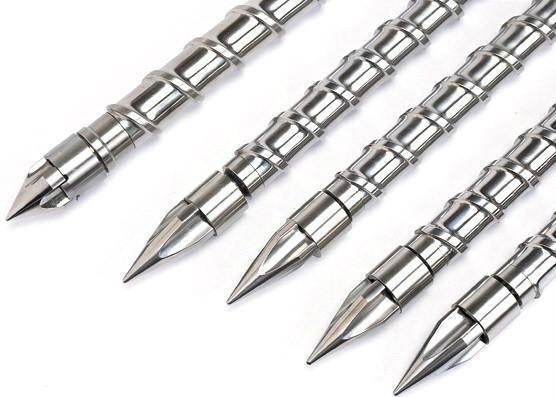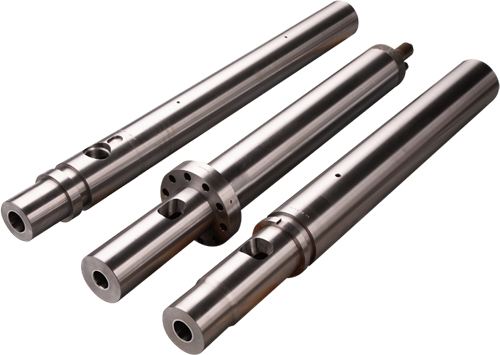- Screws
- Injection Moulding Screw
- Mixing Screw
- Barrier Screw
- Extrusion Screw
- Barrels
- Ring Plungers
- Tie Bar
- Hydraulic Cylinder & Piston
- Available inventory
Screws
At Den Scoth Engineering Pvt. Ltd, we manufacture all kinds of screws ... custom screws for extrusion, blow and/or injection molding screws, mixing screws, even rebuilt screws. If you need a screw for your project, we can help.
Injection Moulding Screw
The selection of the proper injection molding screw design for a given processing environment should be based on the resin or resins to be processed. There are no standards in the plastics industry for a general purpose injection molding screw design.
The OEM general purpose injection molding screw designs are each different. A processor must be diligent in understanding an OEM GP design and how it will affect the way the resin melts. Each design will process differently.
In an injection molding plant utilizing machines manufactured by different OEMs, more than likely there will be jobs that run better on some than others. Due to the different OEM GP designs, obtaining the proper residence times and shear rates to achieve an homogenous isothermal melt quality on each machine may be difficult to do. Some resins cannot tolerate high shear rates, higher temperatures and/or longer residence times.
The injection molding screw geometry needs to match the resin. The more the melt and shear curve of a material(s) is accommodated, the greater the opportunity to achieve a high quality, homogenous isothermal melt quality.
Den Scoth Pvt. Ltd has a strong reputation for developing custom – general purpose – injection molding screw designs tailored to making the same job run similarly on all machines in a particular plant.

Mixing Screw
The Mixing Screw is a low shear plastics mixing screw that provides the processor with outstanding color mixing. In addition, many of the processors using they have experienced improved production rates, both in recovery rate and throughput (pounds per hour).
Although the design of the screw and mixer are modified somewhat for different resins, has successfully processed commodity resins as well as engineering grade resins.
The Mixing Screw has:
- Improved production rates by more than 25%
- Reduced part reject rates from more than 5% to less than 1%
- Reduced the amount of color concentrate required to achieve optimum color mix from 4% to 3%
.jpg)
Barrier Screw
The Ultimate Processing Solution.
The Barrier Screw combines the advantages of the mixer with the plastic melting efficiency of the barrier screw design. Its “solids and melt” channels provide the effective melting of all resins, especially the “hard-to-melt” crystalline resins.
The material is then conveyed through the mixer to produce a high quality, isothermal melt. The Barrier may be the answer for processing difficult materials, whether using an injection molding screw or blow molding screw, or extrusion screw.
The design of the barrier portion of the screw and the mixer itself is dependent upon the type of material being processed and whether the application is injection molding, blow molding or extrusion. The Barrier has been Den Scoth most effective design for all types of extrusion applications and has worked effectively in injection molding high melt index materials.
.jpg)
Extrusion Screw
Practically all thermoplastics can be processed by extrusion, but in order for the extrudate to maintain its shape until solidification, extrusion grades require a higher molecular weight associated with higher viscosity and melt strength. Melt Index, which relates to strength and flow behavior, is lower for extrusion materials than for injection materials where the easier flowing material is necessary to fill cold molds.
A major difference between injection molding and extrusion relates to the time that the material has to melt. In injection processing, a pellet typically has 2 to 5 minutes from the time it enters the barrel from the hopper until it exits the nozzle end of the screw. This residence time allows the resin to heat, soak and absorb conductive heat energy (in addition to shear heat) as it works its way up the screw.
In extrusion, a pellet is typically allowed less than 2 minutes (and in some cases, less than one minute) to travel from the feed pocket of the screw to the screen pack.
The most obvious difference between injection and extrusion screw designs is the length of the flighted surface, or the L/D ratio. Where a 20:1 ratio is common for injection molding screws, 24:1 is considered a standard L/D ratio for extruder screws- and many have ratios of 30:1 or more. Lacking residence time, extruder screws must compensate by keeping the material on the screw for a greater length.
Extrusion screws tend to have greater shear capability, resulting from the increased use of barrier designs and the utilization of a grooved feed zone in the barrel. A shallow feed zone channel in the screw in combination with a grooved feed section in the barrel also creates shear and a more aggressive feeding of the material.
Den Scoth Pvt. Ltd. has been successful in its extruder screw designs.
__01__018.jpg)
Barrels
We manufacture barrel for injection molding and extrusion machine.
Nitraded Barrel
Nitraded barrel made from Nitrading material . This barrel go for gas nitrading process which is used to create a surface hardness on the barrel. The hard layer of steel very in depth from 0.5 to 0.7mm depending upon the length of the nitrading cycle. The hard layer have hardness of 60 to 66 HRC which is achieved by heating the steel in an atmosphere of nitrogen at temperature of 950 to 1050 degree F. The nitrogen atoms are diffused into the surface of the steel combining with nitride-forming elements, such as chromium, aluminum, molybdenum, vanadium, tungsten and titanium, to produce a very hard surface, particularly for the first 0.1 to 0.5 mm depth. Nitrided barrels have a very good wear resistance until the surface hardness is worn away. After the surface is worn 0.5 mm, wear accelerates and the barrel may quickly be worn to a condition that is beyond repair.
Nitrided barrels are not recommended for use with abrasive or corrosive resins because of their inability to resist wear over an extended time period.
Bimetallic barrel.
In this type of barrel, sleeve is inserted into the id of the barrel to prevent the barrel from wear for longer duration. Use of this type of barrel depends upon the application of barrel.

Ring Plungers
We are a professionally managed company engaged in manufacturing and supplying a highly functional series of Ring Plunger Set. These sets are suitable to be installed in machines in order to ensure excellent fabrication process of raw states. This Ring Plunger Set is mostly applicable for injection molding machine. This product has the high tensile strength appreciated in the market for its precise construction and exceptional strength.
We hold industry expertise in manufacturing Injection Moulding Machine Ring Plunger Set, which has high tensile strength that is obtained by toughening of the basic materual.
Manufactured using high-grade material, the set is highly reliable and durable. Our clients can avail various sizes and designs as per their requirements.
.jpeg)
Tie Bar
Den Scoth tie bars to meet your specification. The tie bar is a key component for consistent and quality molding, as it maintains a parallel orientation of the platens.
.jpg)
Hydraulic Cylinder & Piston
We Den Scoth Engineering pvt.ltd. also manufature hydraulic cylinder and piston with excellent in quality.
Available inventory
We plan for our clients regarding which component they require yearly. So by collecting all necessary data from our clients, we manufacture item such as screw, barrel, tie bar,ring plunger etc. in our company stock.
| Items | Description | Quantity |
| Barrel Set |
32 ID Barrel ( Mat Extruder) 32 Dia Screw |
10 set |